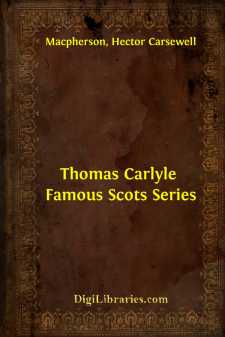Categories
- Antiques & Collectibles 13
- Architecture 36
- Art 48
- Bibles 22
- Biography & Autobiography 813
- Body, Mind & Spirit 142
- Business & Economics 28
- Children's Books 14
- Children's Fiction 11
- Computers 4
- Cooking 94
- Crafts & Hobbies 4
- Drama 346
- Education 46
- Family & Relationships 57
- Fiction 11829
- Games 19
- Gardening 17
- Health & Fitness 34
- History 1377
- House & Home 1
- Humor 147
- Juvenile Fiction 1873
- Juvenile Nonfiction 202
- Language Arts & Disciplines 88
- Law 16
- Literary Collections 686
- Literary Criticism 179
- Mathematics 13
- Medical 41
- Music 40
- Nature 179
- Non-Classifiable 1768
- Performing Arts 7
- Periodicals 1453
- Philosophy 64
- Photography 2
- Poetry 896
- Political Science 203
- Psychology 42
- Reference 154
- Religion 513
- Science 126
- Self-Help 84
- Social Science 81
- Sports & Recreation 34
- Study Aids 3
- Technology & Engineering 59
- Transportation 23
- Travel 463
- True Crime 29
Thomas Carlyle Famous Scots Series
Description:
Excerpt
CHAPTER I
EARLY LIFE
'A great man,' says Hegel, 'condemns the world to the task of explaining him.' Emphatically does the remark apply to Thomas Carlyle. When he began to leave his impress in literature, he was treated as a confusing and inexplicable element. Opinion oscillated between the view of James Mill, that Carlyle was an insane rhapsodist, and that of Jeffrey, that he was afflicted with a chronic craze for singularity. Jeffrey's verdict sums up pretty effectively the attitude of the critics of the time to the new writer:—'I suppose that you will treat me as something worse than an ass, when I say that I am firmly persuaded the great source of your extravagance, and all that makes your writings intolerable to many and ridiculous to not a few, is not so much any real peculiarity of opinion, as an unlucky ambition to appear more original than you are.' The blunder made by Jeffrey in regard both to Carlyle and Wordsworth emphasises the truth which critics seem reluctant to bear in mind, that, before the great man can be explained, he must be appreciated. Emphatically true of Carlyle it is that he creates the standard by which he is judged. Carlyle resembles those products of the natural world which biologists call 'sports'—products which, springing up in a spontaneous and apparently erratic way, for a time defy classification. The time is appropriate for an attempt to classify the great thinker, whose birth took place one hundred years ago.
Towards the close of the last century a stone-mason, named James Carlyle, started business on his own account in the village of Ecclefechan, Dumfriesshire. He was an excellent tradesman, and frugal withal; and in the year 1791 he married a distant kinswoman of his own, Janet Carlyle, who died after giving birth to a son. In the beginning of 1795 he married one Margaret Aitken, a worthy, intelligent woman; and on the 4th of December following a son was born, whom they called Thomas, after his paternal grandfather. This child was destined to be the most original writer of his time.
Little Thomas was early taught to read by his mother, and at the age of five he learnt to 'count' from his father. He was then sent to the village school; and in his seventh year he was reported to be 'complete' in English. As the schoolmaster was weak in the classics, Tom was taught the rudiments of Latin by the burgher minister, of which strict sect James Carlyle was a zealous member. One summer morning, in 1806, his father took him to Annan Academy. 'It was a bright morning,' he wrote long years thereafter, 'and to me full of moment, of fluttering boundless Hopes, saddened by parting with Mother, with Home, and which afterwards were cruelly disappointed.' At that 'doleful and hateful Academy,' to use his own words, Thomas Carlyle spent three years, learning to read French and Latin, and the Greek alphabet, as well as acquiring a smattering of geometry and algebra.
It was in the Academy that he got his first glimpse of Edward Irving—probably in April or May 1808—who had called to pay his respects to his old teacher, Mr Hope. Thomas's impression of him was that of a 'flourishing slip of a youth, with coal-black hair, swarthy clear complexion, very straight on his feet, and except for the glaring squint alone, decidedly handsome.' Years passed before young Carlyle saw Irving's face again.
James Carlyle, although an austere man, and the reverse of demonstrative, was bound up in his son, sparing no expense upon the youth's education. On one occasion he exclaimed, with an unwonted outburst of glee, 'Tom, I do not grudge thy schooling, now when thy Uncle Frank owns thee to be a better Arithmetician than himself.' Early recognising the natural talent and aptitude of his son, he determined to send him to the nearest university, with a view to Thomas studying for the ministry. One crisp winter's morning, in 1809, found Thomas Carlyle on his way to Edinburgh, trudging the entire distance—one hundred miles or so....


